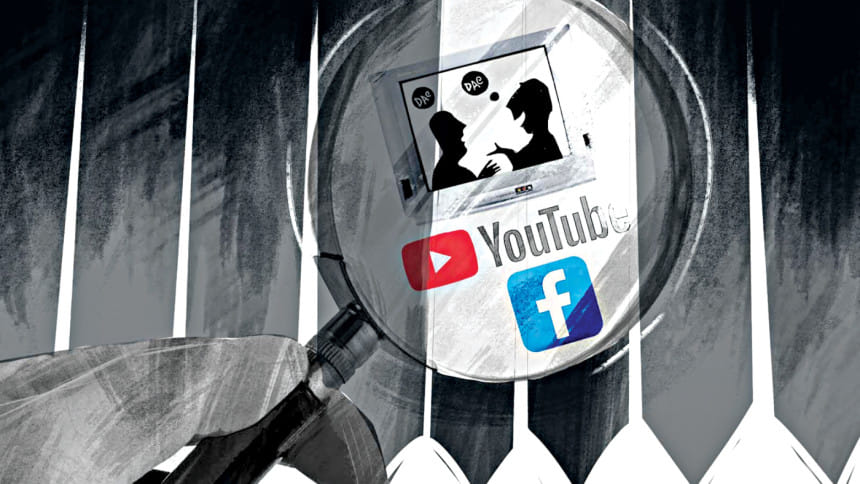Bangladeshis are so ‘senti’

Bengalis are well-known for being unusually driven by emotion, a trait that has brought about many great things—our right to speak in our mother tongue, our right to be independent. But there are also emotions that cannot even be translated—like "obhiman", an emotion shared by our other South Asian friends, which could be described as hurt pride that crops up at the drop of a hat. This is amply displayed in old Bangla (and Hindi) films or dramas where the protagonists stubbornly indulge in this emotion to ensure that characteristic tear-jerking ending. In general, it is quite natural for us to become "senti" (sentimental) over the smallest things—like someone forgetting to acknowledge a "big brother's" position in the social food chain by not giving him the mandatory reverent "salam", which, in the contemporary context, may lead to dismemberment or a painful death.
Now that we have reached the digital age and are hell bent on embracing it with a vengeance—we have also acquired the ability to be digitally sentimental. Even what I have written so far could be considered "harmful" or "offensive" or even racist despite the fact that I belong to the race I am poking fun at. Poking fun? Are you out of your mind? We no longer believe in humour anymore didn't you know? In fact, sharing a cartoon may cause grievous injury leading to death. Sorry for the constant death references but our lives often do have an air of The Godfather trilogy.
We are so serious about our sentiments that we are not satisfied with having one choking legal instrument—the Digital Security Act (DSA) to deal with troublemakers. Now we are planning to give it some added support like an unnecessary second corset to pad the first one and make sure that above all, no one dares to hurt anyone's sentiment. Yes, we're that serious about our emotional health. Hence the BTRC (Bangladesh Telecommunication Regulatory Commission) regulation applicable for digital platforms, social media and OTT - Over the Top platforms. So anything you publish digitally is open for scrutiny by the powerful BTRC ninjas and may lead to long term incarceration. Even with just the DSA, people have found themselves in jail for what people in other countries may consider strange to be seen as crimes—such as singing a song written by an acetic who may have made philosophical observations about spirituality, for being a concerned citizen, or for trying to expose corruption of public officials. If you thought you were safe sending videos of Putin and Zelenskyy singing that catchy Hindi film song "Jati hu mey.." to your buddies on WhatsApp, think again. Someone important enough may feel "hurt" or "offended" on behalf of either one of them or feel this may sour relations with another country and so is "anti-state" and wham... The notion of back to back encryption no longer holds with the DSA and the BTRC regulation. It has become a myth just stated to make you feel you are a valued client whose privacy matters. Actually privacy of a citizen has become an endangered species and it would be practical to just consider it extinct and get on with life. Let's not get emotional about everything shall we?
Speaking of misplaced emotions, a coalition of around 45 organisations that still believe that human rights are inalienable and sacred have sent an earnest letter requesting BTRC to reconsider this regulation that "imperils people's freedom of expression, and right to privacy, undermines encryption and weakens online safety". They further say: "If enforced, the regulations will have a deleterious impact on human rights, and put journalists, dissidents, activists and vulnerable communities, in particular, at greater risk"
These organisations are also not too happy about the government's plan to adopt a code of ethics which all media would have to comply with (or else…) which would give the Ministry of Information a free rein to control content, something that violates international law. International law my foot, they scoff.
To make things more interesting, the new regulation requires registration of all online platforms and we all know how easy it is to get official registration for anything through regular routes. And think of all the OTT platforms. How will we exist if our favourite Netflix shows—our mainstay in terms of mindless entertainment—are considered "harmful" or "incite hatred" and "hurt all kinds of sentiments of all kinds of people", and just censored out? Then of course there are local platforms where popular shows, films and drama serials are aired which may have content that will embarrass or irritate someone or some entity—should we just tell our directors and actors and production people to pack up and try for BTV jobs? That seems the safest bet—at least they will survive even if their creative souls will shrivel up and die a premature death.
Those who have come up with this regulation have decided that vague, arbitrary ideas of being snubbed or having one's religious sentiments trod upon are far more injurious (to certain privileged groups, not all and sundry please) and must be deterred by having citizens locked up in jail for years or having their voices gagged rather than uphold archaic concepts like "freedom of speech", human rights and freedom of expression. In the digital world, we just need some bots or humans who act like bots, religiously following the commands fed to their systems, with no deviation and no attempts to act too clever. This way everyone, I mean those that matter, will remain emotionally happy and can carry on their lives with their sentiments intact and without the nuisance of pesky citizens with the gall to have opinions of their own.
Aasha Mehreen Amin is senior deputy editor at The Daily Star.

 For all latest news, follow The Daily Star's Google News channel.
For all latest news, follow The Daily Star's Google News channel. 



Comments